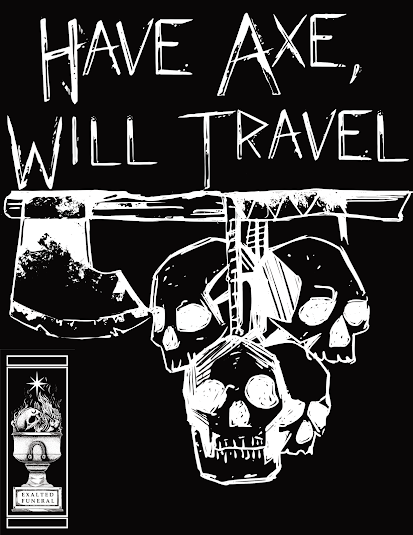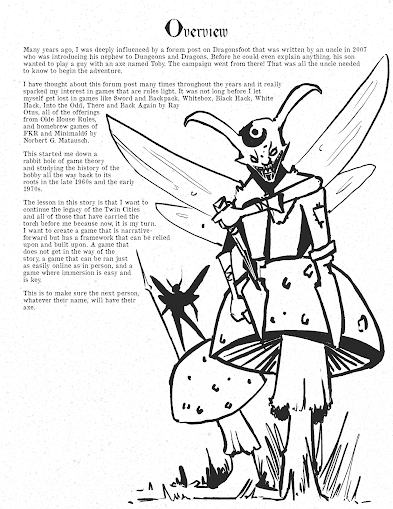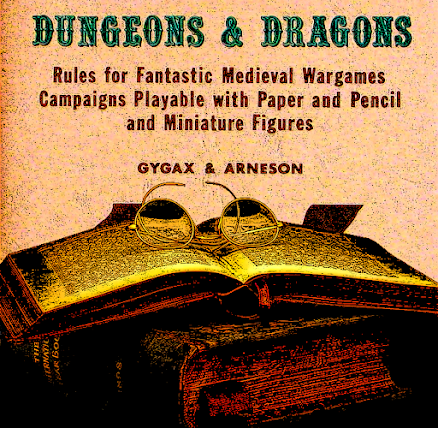It should come as no surprise that Robyn and I love minimalist gaming. So when we chance upon a good example, we can't resist the opportunity to toot its horn and pitch the style to anyone within earshot of our megaphone. Turns out a good example of the Free Kriegsspiel is Have Axe, Will Travel, the latest from James Hook (Talon Waite to some) and Exalted Funeral. It's an inspired little system; and in addition to saying why, it's a perfect opportunity to evangelize and make the case why this might be the system to start with:
Physical production is nice, straddling the line between primitive roughness and elegant presentation. With artwork by Inked Gas and some excellent font choices (I'm in love with the body font and grainy watermark), you really get an amateur, old-school atmosphere, which speaks to the core of its identity and aspirations. There's old-school, and then there's a deep time of the hobby; an Arnesonian time when games were minimalist affairs dependent on robust social contracts and a freeform narrative born of pulp goodness...
And HAWT lives up to its aspirations. Some rules are almost bullet papers, others denser treatments brimming with more than enough. HAWT wisely steers a middle course, offering up meaty details with a clever eye towards just enough to explain things adequately while providing room for the reader's imagination to blossom. You're almost immediately thinking of what you can do with these rules; essential, but often overlooked as a yardstick.
Character creation is an elegant, 7-point process, chief among them traits. Who (and/or what) is your character? From nimble elf to magical tree person, this is negotiated between the referee, who builds their setting, and the participants. All too often, I've seen novice players come with great ideas, only to get shot down (and possibly discouraged) by the rules. This is Free Kriegsspiel in it's purest form, friendly to creatives; and anyone who appreciate the approach will find a masterful expression of the concept at their fingertips...
Traits include a profession; again, negotiated, along with languages and cosmic bondage, alignment in the game's unique parlance. How long should it take to say you want to play an elven archer? Or to work out that you come from the Blue Forest? Free Kriegsspiel says people are in the best position to decide - but so does HAWT. Readers are also treated to one of the best explanations of Law, Chaos, and Neutrality I've read anywhere, bounded by wonderful artwork that screams OD&D rendered by abler hands for added flavor.
Oh, and you get one extraordinary ability useable once a day, whether a magical pet who intervenes at critical moments or whatever, barring the godlike and game breaking (and again; who better than the players to say what that looks like). It's great stuff, and very much in the spirit of Arneson. You're playing to have fun, not to struggle through daunting rules seeking the perfect mechanical build. Imagine if literary characters were made that way; no, give me Conan and Frodo - or doom-haunted Elric with his sea of troubles.
And there's money, a starter kits of sorts, and equipment tables. Every effort is made to balance breadth and depth on the side of freeform gameplay, which seems instantly easier just following the book's guidance. Those seeking tedious explanations of the system's monsters are missing the point of Free Kriegsspiel. The referee gets to build on their vision, which assures engagement for those who never tire of flexing their own imaginations in service to a fun shared experience. HAWT caters to this creative audience...
And what of Gameplay? If you can do something (common sense and traits) roll 2d6, with a result on 5 or 6 on either die meaning success. Acting at an advantage, whether skills or circumstance, roll additional dice; when acting at a disadvantage, roll less. It's a simple and organic system that works well in practice. There's no adding or needless calculation, just eyeballing results, which Robyn and I liked a lot when we tried it. And there's Might, serving as hit points and a resource to expend gaining advantage or casting spells...
In this sort of game, choices are everything; and rather than just roll for success or failure, players tell their tale with resources that steer their fate. It's not story gaming; but something in line with what Arneson had in mind. But Might can also be spent casting powerful spells; provided - but with room to grow - limited only by the participant's imagination. This involves imprisoning spirits in runic objects, channeling the sorcery of historical imagination more than the impersonal science of D&D. I find it a nice departure from Vancian stuff for sure.
Characters advance. They fight monsters, win treasure, and get better. This content is provided, showcasing its simplicity (monsters get three easy stats). And there's the expected other stuff; overland travel, structural damage, the works. Its offerings are amply robust, complete and quickly extracted from the text for easy reference, which harkens back to what a rulebook should provide when not dabbling in heady fare. And even if you don't plan on tackling the rules as written, there's a body of useful - and universal - material.
Gaming is rules; but it's also technique. And philosophy. To this end, and to tie it all together, HAWT includes advice galore, both from it's author and contributors from across gaming community. Full disclosure: I'm one of them. Scott Malthous, Wizard Lizard, and Phantasm 72 add their voices, along with Tad Vezner, a seasoned veteran of the first dungeon adventure regaling the reader with invaluable experience (this one's almost worth the price of admission in my humble opinion). The author knows the genre - and recognizes a kindred spirit...
Oh, and there's a sample adventure in homage to Arneson and a character sheet that nails the freeform spirit of the game. All told, it's a solid minimalist package, and one that ultimately succeeds as a toolkit around which clever referees can build their own universes.
VERDICT: Have Axe, Will Travel is a minimalist Free Kriegsspiel game that thoroughly understands - and respects - the genre and presents it well. Some hobbyists are intimidated by this approach, finding it untethered. HAWT shows that it can possess a solid structure while invoking the creative instincts of its participants, making it a great choice for seasoned minimalists and enthusiastic newcomers ready to flex their imaginations. If this sounds like your cup of tea, Have Axe, Will Travel is a worthwhile addition to your shelf and table...



